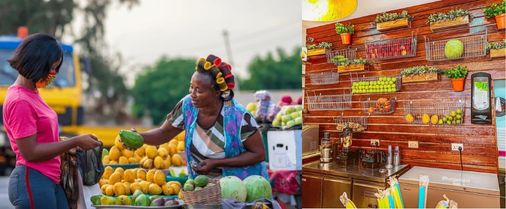In recent years, a quiet but powerful revolution has been stirring across Nigeria’s food and beverage industry. While suya spots, fast food outlets, and heavy-carb dishes like jollof rice and pounded yam still dominate mainstream appetites, another scene is emerging, one driven by chia seeds, quinoa, smoothie bowls, plant-based proteins, and sugar-free snacks. This is the business of healthy eating, and Nigerian entrepreneurs are positioning themselves to profit from the growing demand for nutritious, wellness-inspired food choices.
A Shift in Consumer Behaviour
Nigeria’s rising middle class, increased access to health information via social media, and the alarming spike in lifestyle-related illnesses have sparked a shift in dietary choices. More Nigerians are reading food labels, googling ingredients, and exploring healthier alternatives to traditional dishes. The youth, especially millennials and Gen Z, are leading the charge, frequenting juice bars, vegan cafés, and fitness studios, lifestyles that intersect with clean eating.
Join our WhatsApp ChannelThis change in consumer behaviour is turning into a viable market. Health-conscious Nigerians are seeking out alternatives that support their long-term wellbeing, and entrepreneurs are taking note.
Health Is the New Hustle
Across Nigeria, small- and medium-scale entrepreneurs are seizing the opportunity. Diet-conscious catering services, healthy meal subscriptions, vegan snack brands, and organic markets are redefining the local foodscape. Smoothie and juice bars are popping up in urban centres, targeting the image-conscious crowd. “Fit-fam” food vendors offer custom keto, low-carb, or vegan meal plans, often operating online and leveraging social media for order placement and community-building.
The numbers reflect this growth, with the health and wellness food market in Nigeria valued in excess of ₦250 billion and poised to grow steadily over the next decade.
Challenges in the Wellness Market
Despite the growth, obstacles remain. Imported healthy food ingredients are pricey, making affordability a major barrier. Entrepreneurs face logistics, spoilage, and supply chain challenges. To address these issues, some businesses are turning to local alternatives like tiger nut milk and moringa, cutting costs and appealing to consumers seeking cultural familiarity.
Tech Meets Taste
Technology is driving the wellness food boom. Online platforms and mobile apps connect health-conscious buyers with curated food options. Social media plays a dual role, as a marketing engine and an education tool. Entrepreneurs use reels and carousels to share nutrition tips, behind-the-scenes processes, and customer testimonials.
READ ALSO: Farm To Shelf: The Logistics Of Getting Healthy Food Into Urban Markets
The Corporate and Policy Angle
The private sector recognises the profitability of wellness, with restaurants adding healthy menu sections and larger food processors exploring low-sugar, low-sodium product lines. Corporate wellness programmes are becoming more common, with companies investing in healthy lunch providers, nutrition workshops, and fitness incentives.
Government support remains limited, but advocates argue that stronger policies could catalyze the industry’s growth. Nigerian-made healthy snacks and wellness products could appeal to African and diaspora markets if properly branded and scaled.
What the Future Holds
The healthy eating trend in Nigeria is likely to deepen, driven by increasing awareness and demand for nutritious food options. Entrepreneurs who focus on innovation, sustainability, and cultural relevance will thrive. Businesses offering affordable, locally sourced, and genuinely healthy products will win the loyalty of a growing base of health-conscious Nigerians.
Conclusion
The business of healthy eating in Nigeria is more than a trend, it’s a movement powered by changing lifestyles, youthful ambition, and a growing understanding of the link between diet and wellbeing. As entrepreneurs innovate in this space, they’re shaping the future of how Nigerians eat and live.
Amanze Chinonye is a Staff Correspondent at Prime Business Africa, a rising star in the literary world, weaving captivating stories that transport readers to the vibrant landscapes of Nigeria and the rest of Africa. With a unique voice that blends with the newspaper's tradition and style, Chinonye's writing is a masterful exploration of the human condition, delving into themes of identity, culture, and social justice. Through her words, Chinonye paints vivid portraits of everyday African life, from the bustling markets of Nigeria's Lagos to the quiet villages of South Africa's countryside . With a keen eye for detail and a deep understanding of the complexities of Nigerian society, Chinonye's writing is both a testament to the country's rich cultural heritage and a powerful call to action for a brighter future. As a writer, Chinonye is a true storyteller, using her dexterity to educate, inspire, and uplift readers around the world.














